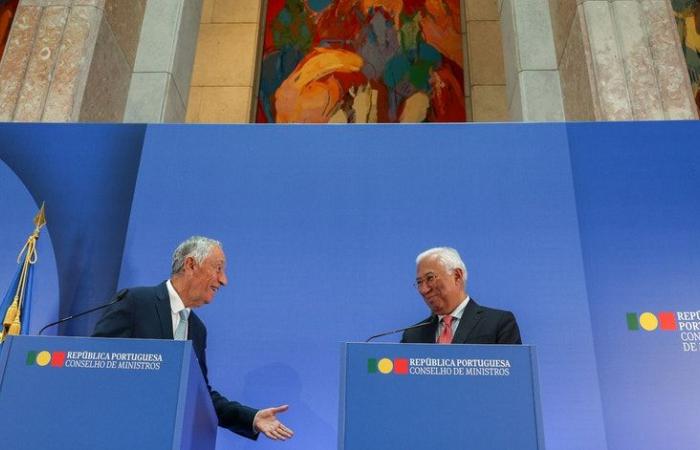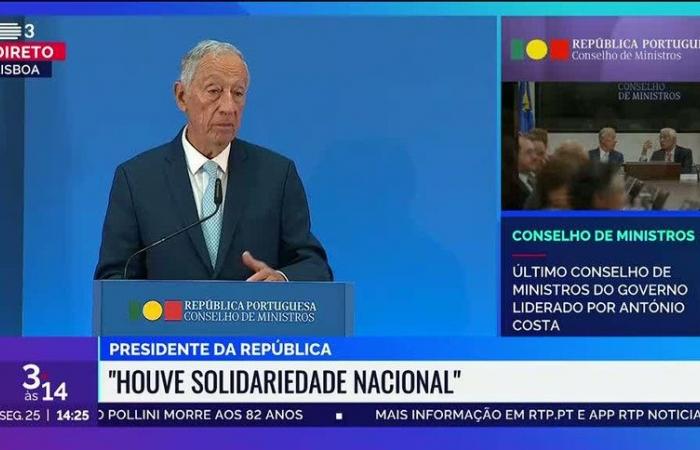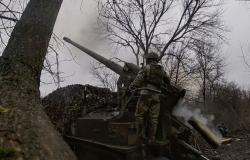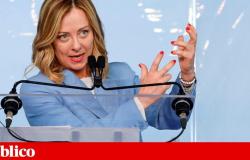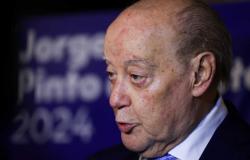António Costa began his farewell speech, starting by thanking Marcelo Rebelo de Sousa for accepting the invitation to preside over the last Council of Ministers of the XXIII Government.
“This is a tradition that I started in the last Council of Ministers under Professor Cavaco Silva”he recalled. “Now that the Government ceases functions, before the president’s last term, we now renew with the last Council of Ministers of this Government’s term”.
More than a gesture of courtesy, continued the outgoing Prime Minister, it serves to “emphasize the importance of institutional cooperation, institutional solidarity, between the Government and other sovereign bodies and especially with the President of the Republic”.
Addressing Marcelo Rebelo de Sousa, and remembering that this is his last public meeting as head of State and head of Government, Costa thanked “these eight years of cooperation and institutional solidarity”.
Admitting that they “did not always” coincide, the prime minister considers that “it will hardly be possible to find another period of our constitutional experience where relations between the Government and the Presidency of the Republic have continued in such a fluid, cooperative and supportive way as has happened in the main over these eight years”.
This last Council of Ministers, which took place this Monday morning, was a “very special” Council of Ministers, in the words of António Costa.
“For this reason, we sought to define a set of matters that (…) could be moments of either definitive approval or approval in general for subsequent consideration by the Government that may succeed us”he explained.
Firstly, the outgoing government officials carried out “an assessment of the implementation phase of the Recovery and Resilience Program”, having “generally approved three diplomas, which are essential for the full presentation of the fifth payment and which are two diplomas relating to the organic structure of the Public Administration and a proposed law on incentives for better functioning of the capital market”.
“The diplomas were generally approved. The homework is done. The new Government will have all the freedom to appreciate, re-evaluate and (…) start from where we are”.
The second matter, he continued, is “another area of interest to the President of the Republic, which has to do with scientific research”.
“We approved a bill proposal on the new career regime in Public Education institutions, State laboratories and Administration entities and, for the first time, a regime for teaching and research staff in Private Higher Education establishments ”.
“Another area of interest for the President of the Republic”, he continued, was the approval of “a bill proposal for a senate in the area of Culture and new private support or financing instruments” for this sector.
“Finally: two fundamental themes. One: a reform of greater importance, which has to do with the renovation of rustic property”, he stated, adding that it is a way of ensuring that the country can “better face the conditions and the enormous risk of fire”. And a second diploma that is a “resolution of the Council of Ministers approving the new national strategy for the inclusion of homeless people”.
In conclusion, António Costa repeated his thanks to Marcelo Rebelo de Sousa.
“It is not an easy system, it requires institutional solidarity”
The President of the Republic, Marcelo Rebelo de Sousa, began by welcoming the invitation of the outgoing Prime Minister, António Costa, for participating in the last Council of Ministers and for having started a practice that could become a tradition and that began with the his predecessor, Aníbal Cavaco Silva.
Marcelo Rebelo de Sousa highlighted the balance found, over the last eight years, between the power exercised by the President of the Republic and the Prime Ministerexplaining that faced with a system that “is not an easy system, (which) requires institutional solidarity”, it was necessary to “put the problems of relations between institutions above political positions, from hemispheres of origin (…) on the left and in my case, the right-wing hemisphere”.
The President of the Republic explained that, At crucial moments, “institutional solidarity was transformed into national solidarity”, making it possible to verify, for example, “unity in the fight against the pandemic” or at various moments in foreign policywhich allowed “a climate of stability when the world is not stable and when Europe is not stable”.
Marcelo Rebelo de Sousa thanked the members of the outgoing Government, and especially António Costa, for the eight years of dedication at the head of three different and successive Governments, and did not close the door on the possibility of both of them meeting again “at other crossroads” in service from Portugal.
“This does not mean that this will be the last time we find ourselves at these crossroads at the service of Portugal”said the President of the Republic.
Tags: Council Ministers Costa Marcelo highlight cooperation institutional solidarity
--
